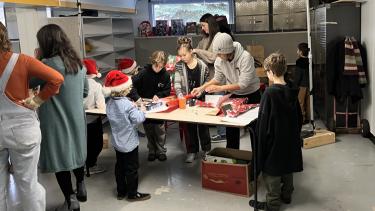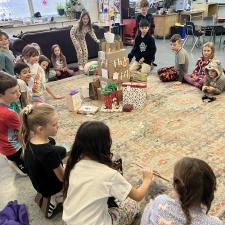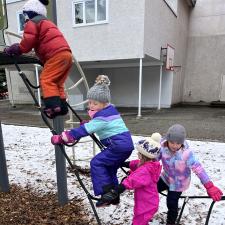Wandering Among the Wildflowers

Well, in the immortal words of Barry Manilow, “Looks like we made it…”, and not only did we make it, but we made it in fine form. I had the privilege to wander through the various learning fairs and seeing them put together and I was absolutely blown away by what has gone on here the past four months. The seedlings class is building a loving and supportive community and taking their first steps into the worlds of numeracy and literacy. The elementary families are diving deep into their theme work and exploring machines, geography, indigenous cultures, and the way the body works. Last but certainly not least, each middle school class put together performances that exemplified their deep knowledge of chemistry and of human rights. These learning fairs not only demonstrate the depth of learning that occurs here at Wildflower but also the fun students have in their learning.
As we head into break, and turn our focus to resting and recuperating, it is important to think about the type of rest that we want to have. There are seven types of rest and we need to experience them all to feel rejuvenated and present our best self to the world. This article talks about the seven types of rest we need, and I encourage you to explore it so that you can get the rest you need over the break.
While rest is important, I wanted to talk about the importance of play and highlight why here at Wildflower we feel play is so important. When children engage in unstructured play, they report feeling joy, thrill and competence. When they don’t, they report feeling bored, sad and angry. In play children experience the uncertainty of challenging or risky play, they can develop emotional reactions, physical capabilities and coping skills that expand their capacity to manage adversity. These skills are important for resilience and good mental health in childhood and into adolescence. Unstructured play is also associated with improved attention span, especially in children who have trouble focusing for long periods of time. Evidence indicates that unstructured play can provide the opportunity to improve social competence. This means that children can improve their problem-solving skills, emotional intelligence, and ability to empathize. Children can become more self-aware and are better able to compromise and cooperate. Studies with schools report fewer problems with undesirable behaviours like bullying when unstructured play is increased. When children lead their own play, they can engage in social and emotional learning, such as the ability to control aggression and regulate feelings of anger and frustration.
Play is not just important in the early years of school though, it’s impactful for everybody. Play has been found to speed up learning, enhance productivity and increase job satisfaction; and at home, playing together, like going to a movie or a concert, can enhance bonding and communication. Psychiatrist Stuart Brown says “Play is a basic human need as essential to our well-being as sleep, so when we’re low on play, our minds and bodies notice.” Over time, play deprivation can reveal itself in certain patterns of behavior: We might get cranky, rigid, feel stuck in a rut or feel victimized by life. To benefit most from the rejuvenating benefits of play, Brown notes, we need to incorporate it into our everyday lives, “not just wait for that two-week vacation every year.” To identify the kind of play that would be most meaningful to you, Brown suggests thinking back to the play you enjoyed as a child and trying to connect that to your life now. For example, a person who was very active as a child may be wise to engage in recreational sports as an adult. This is also a great opportunity to form connection with our kids and build shared interest with them that can last into their adult years. So, enjoy a rest, but also make sure you incorporate play into your holiday plans.
I hope that you have a wonderful holiday season and a happy new year.



